March eNews
BCMD Staff Planning Meet 2025
BCMD convened its annual staff planning meeting from April 3rd to 5th April to reflect on past achievements, address challenges, and chart a collaborative path forward for the year. The three-day session, marked by active engagement and critical discussions, was held in a spirit of renewal and shared commitment to BCMD’s mission.
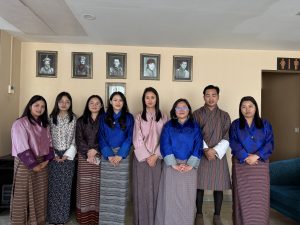
The team revisited the organisation’s core values, goals, and mission, engaging in meaningful dialogue around what inspires BCMD’s work and how its values must evolve with changing times. Staff proposed updates to the mission and guiding principles, recognising the need to realign their goals to reflect grassroots realities.
Staff shared reflections from the field—highlighting the effective coordination with respective focal in rolling out training and its step down activities, the importance of simplifying content for diverse audiences, and the growing need for a Monitoring and Evaluation (M&E) framework to guide and assess impact.
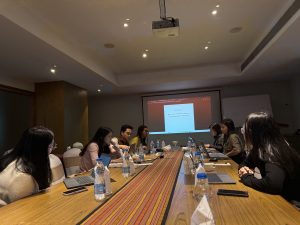
Allowing for better clarity and coordination across programmes, each staff updated their Annual Work Plans and set targets for Appraisal 2025. All staff contributed updates to their activity timelines, ensuring alignment with organisational goals. A candid open discussion also surfaced concerns and challenges related to human resource processes, creating space for collaborative problem-solving.
The 2025 planning meeting reaffirmed BCMD’s commitment to empowering communities through civic engagement, inclusive education, and media literacy. With refined values, updated plans, and a unified team, BCMD is poised to continue its impactful work across Bhutan—fostering a vibrant democracy from the grassroots up.
GNH-Based Participatory Planning and Community Analysis
The traditionally hierarchical nature of Bhutanese society has normalised a culture of people being accepting of, and relying perpetually on the centralised power structure to make both decisions and provide for them and in shaping their lives and communities. Complacencies among the people limit their ability to understand the importance of not only their rights, but also their responsibilities in the determination of their development needs and their proactive participation at the local level which is crucial for citizen empowerment, distributing resources and opportunities equally and thereby removing inequalities in the society. This has fostered a culture where citizens expect the state to manage all aspects of community planning and public service delivery, resulting in passive public engagement. A culture of passive public engagement remains, and marginalised groups, including youth, women, and people with disabilities, often go unheard in community planning ultimately hindering a thriving democracy, as envisioned and gifted to the people by the King in 2008.
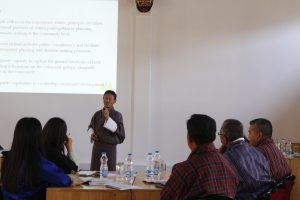
In light of these, A five-day Training of Trainers (TOT) on GNH-Based Participatory Planning and Community Analysis was conducted concluding on 29th March, 2025. Participants included Tsirang Sector Heads, Gewog Administration Officers (GAOs), and Civil Society Organisations (CSOs) working in Tsirang Dzongkhag. The training aimed to equip them with skills for inclusive community consultation and evidence-based planning. While the training emphasised that communities should be at the centre of all planning, many gewog administrative officers admitted that their past consultations had been only at the surface, often overlooking and missing out the needs of the diverse voices, of youth, women and people with disabilities in decision-making processes.
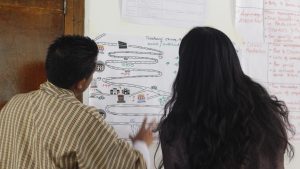
Participants were introduced to eight participatory planning tools under four GNH themes, covering key aspects such as social and economic resource mapping, gender analysis, stakeholder identification, and public service delivery analysis. Using these tools, they learnt the development of inclusive community development plans, which were presented in the plenary session. Following the ToT, the Master Trainers from this cohort will train local officials from all 12 gewogs of Tsirang Dzongkhag on carrying out evidence-based inclusive community planning in their respective localities. The recently trained participants will take on the role of co-facilitators, working alongside BCMD to guide the next phase of capacity building to assess and identify community needs, co-create development plans and explore co-solutioning responses by the community members to help reduce dependency on external parties for resolving their issues all the time.
BCMD and Deutsche Welle Akademie Host Virtual Exchange on Good Governance
On 26th March 2025, the Bhutan Centre for Media and Democracy (BCMD) and Deutsche Welle Akademie (DWA) organised a Virtual Exchange Session on Good Governance, bringing together members of parliament, civil society representatives, development partners, and the media.
Dr. Sonja Schirmbeck from the Friedrich Ebert Foundation emphasised the importance of democratic engagement through political education, informed voting, and Citizens’ Assemblies, an innovative approach promoting inclusive decision-making.

Dr. Ansger Klein from the German Federal Network for Civic Engagement explored the evolving role of civil society in Bhutan’s democracy, highlighting youth and media engagement and international cooperation opportunities.
Dr. Paulo Rosa and Mateusz Tokarski from the European Commission’s Joint Research Centre introduced participatory democracy models, including citizen panels and the Young Citizens Assembly on Pollinators, empowering youth in policymaking.
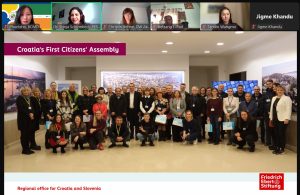
The discussion reinforced the importance of collaboration among key stakeholders in fostering a more inclusive and participatory democratic process. The session also addressed the role of social media in youth engagement and the need for inclusive mechanisms that enable the participation of vulnerable groups. This event was carried out with support under the EU-funded project ‘Building Inclusive Democracy: Civil Society, Parliamentarians, Media, and Youth Strengthen Good Governance in Bhutan’.
The Bhutan Democracy Forum 2025
An important platform for talking about how to enhance gender-responsive governance at the local and national levels was the theme for Bhutan Democracy Forum 2025. The event on 11th March, brought together policymakers, judiciary, educators, young leaders, civil society organisations (CSOs), and other stakeholders to identify gaps, discuss best practices, and provide feasible solutions for advancing gender-inclusive governance.
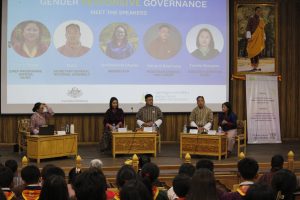
The forum featured two structured panel discussions aimed at enhancing gender inclusion at different governance levels. The first panel, “Gender-Responsive Governance: Fostering Gender Inclusivity Across Sectors,” focused on national-level policies and frameworks. Panelists examined existing gender-related policies, assessed their effectiveness, and identified gaps that hinder inclusivity across various sectors. Discussions highlighted systemic barriers such as policy implementation challenges, societal norms, and institutional biases that often limit gender equality in decision-making processes.
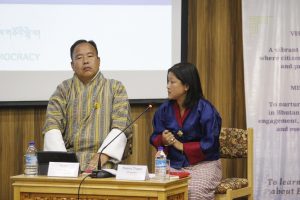
The second panel, “Gender-Responsive Governance: From Policy to Practice,” shifted the focus to local-level governance, exploring how national policies translate into action at the grassroots level. Panelists shared insights into real-world challenges, including limited resources, cultural constraints, and the need for stronger community engagement in gender-sensitive governance. Through these discussions, the forum uncovered common barriers affecting gender inclusion across both national and local levels while also revealing distinct differences in the nature of obstacles faced at each level.
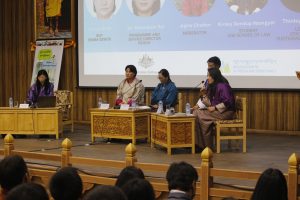
By identifying key challenges and exploring potential solutions, the panels contributed to a broader understanding of how gender-responsive governance can be effectively implemented to foster a more inclusive society.
The Bhutan Democracy Forum 2025 concluded with a strong reaffirmation of the commitment to gender-responsive governance, emphasising the need to bridge the gap between policy and practice. The forum identified the need for urgent actions to implement the proposed solutions, from gender-neutral policies shifting to gender-responsive ones, actively addressing systemic inequalities through targeted measures such as mentorship programmes, enforced gender quotas, and robust financial and institutional support for women at both local and national levels.
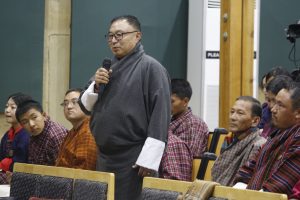
The forum called on the need for strengthened collaborations between government institutions, civil society organisations, and other key stakeholders to ensure that governance structures in Bhutan support necessary policy changes to make it inclusive and responsive.
The forum was funded by the Australian Government, Department of Foreign Affairs and Trade.
